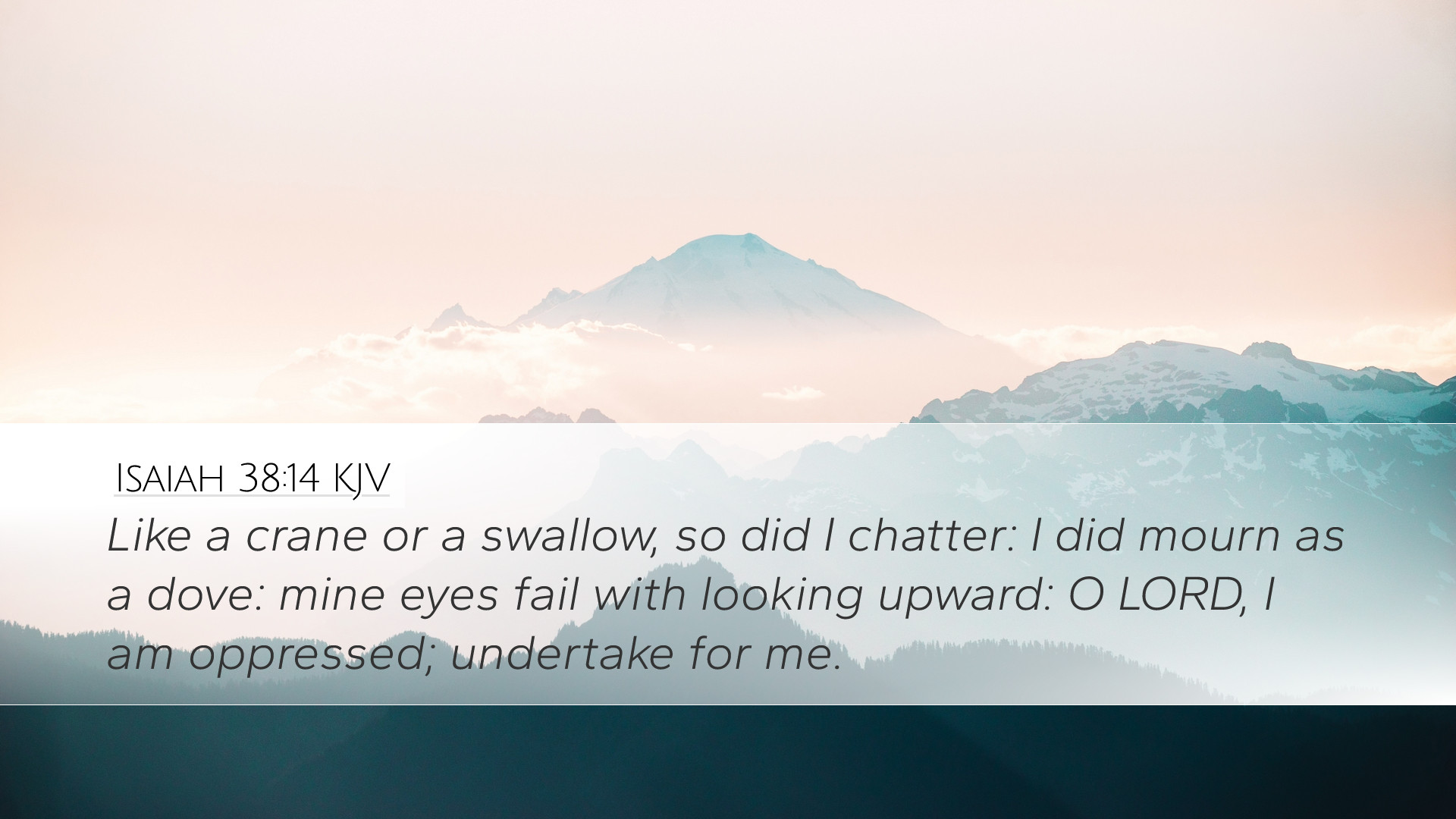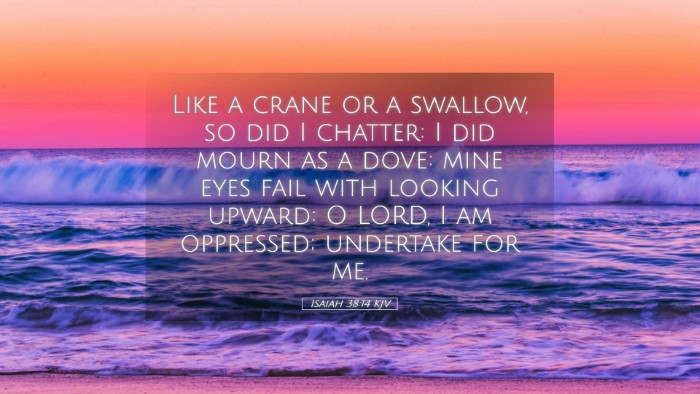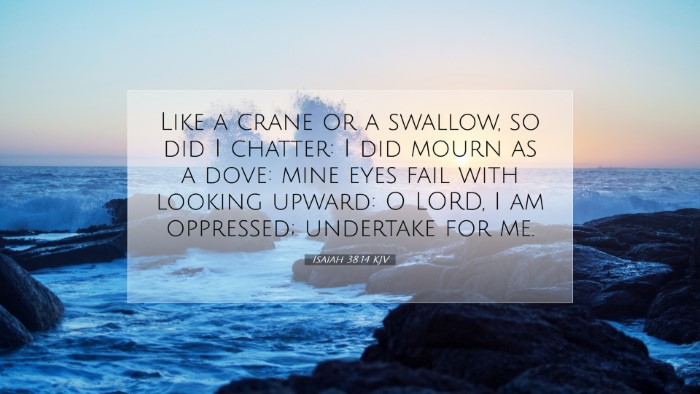Commentary on Isaiah 38:14
Isaiah 38:14 states:
"Like a crane or a swallow, so I chattered; I moaned like a dove; My eyes fail from looking upward. O Lord, I am oppressed; Undertake for me!"
Overview of the Verse
This verse captures a profound moment of distress in the life of King Hezekiah, expressing his deep anguish and plea for deliverance. The imagery of a crane and a swallow, both known for their mournful calls, communicates the depth of Hezekiah’s sorrow as he faces a grave situation.
The Context of Hezekiah's Lament
Hezekiah, a king of Judah renowned for his reforms and faithfulness to God, found himself in a dire situation when he received news of his impending death due to illness. This context is vital for understanding the emotional weight behind his words. The historical backdrop provided by Matthew Henry's commentary emphasizes that Hezekiah was a righteous king, often afflicted by the challenges posed by surrounding nations.
Insights from Matthew Henry
Matthew Henry elaborates on Hezekiah's response to his impending death:
- Desperation in Prayer: Henry describes Hezekiah's prayer as an earnest cry, reflecting a heart fully aware of its condition. He compares Hezekiah's vocal lamentation to the cries of distressed birds, indicating a natural and instinctive response to affliction.
- Human Vulnerability: The reference to physical weakness and emotional turmoil highlights the human vulnerability even in a faithful servant of God. Hezekiah’s emotional expressiveness serves as a lesson to believers on the importance of transparency before God.
Albert Barnes' Interpretation
Albert Barnes provides a detailed look into the rhetorical devices Hezekiah employs:
- Imagery of Animals: Barnes affirms the symbolism of the crane and the swallow, noting their characteristics of mourning and their migratory nature, which could reflect Hezekiah’s desire to escape his troubles.
- Moaning like a Dove: He comments that this symbolizes a state of lamentation and anguish, illustrating Hezekiah's helplessness and the depth of his emotional state.
Insights from Adam Clarke
Adam Clarke’s exposition dives deep into the details of Hezekiah’s mental state:
- Failure of Eyes: Clarke emphasizes the phrase "My eyes fail," suggesting a loss of hope and vision for the future. He interprets this as Hezekiah facing his mortality and the anguish that accompanies such a realization.
- Divine Undertaking: The request "O Lord, I am oppressed; Undertake for me!" indicates a profound reliance on God’s ability to intervene. Clarke notes that the heart of the prayer is an acknowledgment of God’s sovereignty over life and death.
Theological Implications
This verse reveals several theological themes important for pastors and scholars alike:
- Human Despair and Divine Intervention: It exemplifies the human experience of despair while simultaneously highlighting the availability of divine assistance. Hezekiah’s dire plight encourages believers to bring their sorrows to God.
- Prayer as a Means of Expression: The vivid expressions used by Hezekiah show that prayer can capture the full range of human emotions. This verse invites believers to approach God honestly, acknowledging their vulnerabilities.
- The Role of Suffering: The suffering of Hezekiah serves as a narrative that informs the believer about the necessity of distress in drawing nearer to God; affliction often leads to a more profound relationship with the Divine.
Application for Modern Believers
For modern readers, this verse invites reflection on the nature of one's relationship with God during times of trial:
- God's Presence in Suffering: Just as Hezekiah cried out in desperation, believers today are encouraged to seek God in their times of distress, fully assured that He listens and cares.
- Understanding the Weight of Mortality: The acknowledgment of impending death not only humanizes Hezekiah but serves as a poignant reminder for all believers about the fragility of life and the need for reliance on God.
- Encouragement for Community Support: Just as Hezekiah had the support of his faith and community, modern believers are reminded of the importance of surrounding themselves with prayerful support during difficult times.
Conclusion
Isaiah 38:14 encapsulates an intimate moment of raw honesty before God, characterized by deep sorrow and a desperate plea for help. Hezekiah's petition not only urges believers to express their emotions in prayer but serves as a testament to God’s faithfulness amidst human suffering. The insights from Matthew Henry, Albert Barnes, and Adam Clarke enrich the understanding of this verse, providing timeless wisdom for pastors, students, theologians, and Bible scholars.


